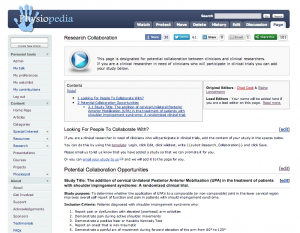 Physiopedia offers a new space for clinical researchers and clinicians to connect and collaborate on research.
Physiopedia offers a new space for clinical researchers and clinicians to connect and collaborate on research.
This new initiative developed by Chad Cook, Division Chair and Professor of Division of Physical Therapy at Walsh University, and Elaine Lonnemann, Associate Professor at Bellarmine University, invites clinical researchers to use the online space in Physiopedia to publicise their future studies and connect with clinicians who would like to participate in clinical trials. The new page titled Research Collaboration lists potential collaboration opportunities. Each listing contains information relating to the future study including study purpose, inclusion criteria, exclusion criteria, data capture, forms, treatment, clinician responsibilities, qualifications for authorship and contact information.
The current listing from Chad Cook is an RCT that will investigate the addition of cervical Unilateral Posterior Anterior Mobilization (UPA) in the treatment of patients with shoulder impingement syndrome. Chad is looking for clinicians who would like to get involved in the study, their responsibilities being randomisation of the subject followed by pragmatic treatment (like you normally would using evidence based approaches) but also provide mobs to the neck to one of the groups. The clinician would need to collect data at baseline, 1 week, and discharge (standard forms) and consent the subject for research, the dat would then be sent to Chad.
Study Title: The addition of cervical Unilateral Posterior Anterior Mobilization (UPA) in the treatment of patients with shoulder impingement syndrome: A randomized clinical trial.
Study purpose: To determine whether the application of UPA’s to a comparable (or non-comparable) joint in the lower cervical region improves overall self-report of function and pain in patients with should impingement syndrome.
Inclusion Criteria: Patients diagnosed with shoulder impingement syndrome who:
- Report pain or dysfunction with elevated (overhead) arm activities
- Demonstrate pain during active shoulder movements
- Demonstrate a positive Neer or Hawkins Kennedy Test
- Report an onset that is non-traumatic
- Demonstrate a painful arc of movement during forward elevation of the arm from 60° to 120°
Exclusion Criteria: A history of frozen shoulder (capsular pattern), disorders of the acromioclavicular joint, degenerative arthritis of the glenohumeral joint, calcifying tendonitis, shoulder instability, posttraumatic disorders, or shoulder surgery and/or elbow, hand, wrist and blatantly misdiagnosed cervical spine disorders (e.g., cervical radiculopathy).
Data Capture: Baseline, 1 week, and Discharge.
Forms: QuickDASH, NAS for Pain, Self Perceived Recovery, PASS (Patient Acceptable Symptom Trait)
Treatment: Conventional, evidence based treatment to the shoulder: Mobs, stretching, and strengthening exercises. Modalities as needed if pain is greater than 5 on the VAS. Standardized HEP for the shoulder. Only the experimental group receives UPA’s to the cervical spine; applied as 3 X 30 seconds, to each comparable (stiff or painful) segment.
Clinician Responsibilities: What would the clinician have to do?: Randomized the subject and treat them pragmatically (like you normally would using evidence based approaches) but also provide mobs to the neck to one of the groups. You would need to collect data at baseline, 1 week, and discharge (standard forms) and consent the subject for research. You would need to mail, fax, or scan the information and send to Chad Cook.
Qualifications for Authorship: Clinicians will be listed as publication authors if enrollment of 14 subjects into the trial and ICJME guidelines of: 1) substantial contributions to conception and design, acquisition of data, or analysis and interpretation of data; 2) contribute to drafting the article or revising it critically for important intellectual content; and 3) final approval of the version to be published.
Contact Person: Chad Cook PT, PhD email:[email protected]
This is an exciting opportunity to expand the collaboration between clinical researchers and clinicians, and to promote research within our profession. If you are interested in taking part in this study please contact Chad Cook directly by email. If you are a clinical researcher and are looking for clinicians to get involved in your trial please email us your future study under the above headings.